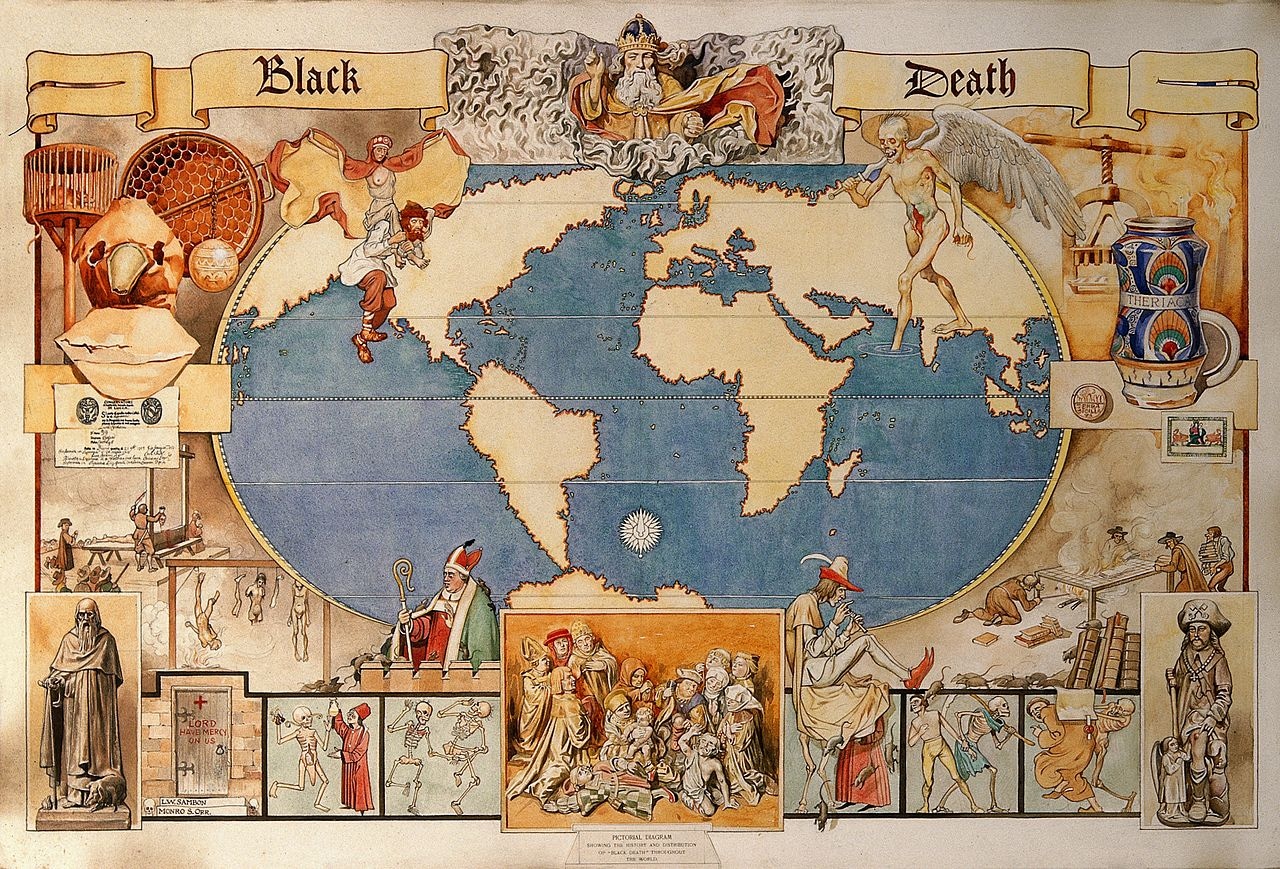Black Plague, Spanish Flu, Smallpox: All Hold Lessons for Coronavirus
What the history of pandemics teach us about the current outbreak. "The black death," a watercolor painting by Monro S. Orr. (Creative Commons)
"The black death," a watercolor painting by Monro S. Orr. (Creative Commons)
Pandemics are nothing new in history, and their long record across the ages and continents has much to teach us about how best to handle the current outbreak, writes California State University professor Ibrahim Al-Marashi in a fascinating piece at the Bulletin of the Atomic Scientists.
Al-Marashi begins with a tour through the animal origins of both common viruses and lethal pathogens, of which COVID-19 is just the latest example. Three-quarters of infectious diseases result from what he calls “zoonotic spillovers,” mostly from common farming animals. “The domestication of the horse led to the virus responsible for the common cold in humans, while the domestication of chickens gave humans chickenpox, shingles, and various strains of the bird flu,” he writes. “Pigs were the source of influenza, and measles, smallpox, and tuberculosis emerged from cattle.” (Popular history often associates the wrong animal with famous outbreaks. For example, the medieval Black Death, commonly associated with rats and fleas, most likely originated with a marmot or great gerbil.)
Al-Marashi argues that modern pandemics hold “key lessons” for us today. Specifically, the need for “transparency as well as the effectiveness of quarantines.” One of these lessons is passed down in the very name of the so-called “Spanish” flu pandemic of 1918. It has this name, writes Al-Marashi, “not because it originated in Spain, but because Spain was the first country to widely publicize the outbreak. Since Spain was not a belligerent in World War I, it did not have wartime censorship in place, while other nations censored the news of the pandemic. Because of the headlines and coverage in the Spanish press, many people simply assumed that’s where the outbreak started.”
There are echoes of this in the way Chinese officials initially ignored the current outbreak, likely making it worse. “[The initial Chinese response] resulted in little critical information being released in a timely manner, depriving national leaders in Beijing the opportunity to implement informed decisions,” he writes, describing the reasons for the delayed quarantine. (The word “quarantine” comes from the Italian “quaranta giorni,” or 40 days, and “was first implemented in the mid-14th century to keep the bubonic plague from spreading from incoming ships.”)
Despite their mostly zoological origins, xenophobic tropes are as old as pandemics, as is what we today call “misinformation.” During the Black Death, writes Al-Marashi, “fake news then included attributing the disease to bad air and miasmas, as well as to Jewish communities. Today, coronavirus has been falsely attributed to biological weapons labs and the Gates Foundation. As an individual, one can fight this virus by debunking the viral myths that spread today, as they did centuries ago.”
Read this full article here.
Your support matters…Independent journalism is under threat and overshadowed by heavily funded mainstream media.
You can help level the playing field. Become a member.
Your tax-deductible contribution keeps us digging beneath the headlines to give you thought-provoking, investigative reporting and analysis that unearths what's really happening- without compromise.
Give today to support our courageous, independent journalists.






You need to be a supporter to comment.
There are currently no responses to this article.
Be the first to respond.